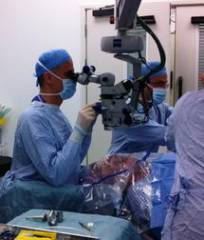
Professor Robert MacLaren from the University of Oxford and Professor Miguel Seabra from Imperial College London are undertaking a clinical trial using gene therapy to treat a disease that causes blindness known as choroideraemia. This condition is currently incurable and affects thousands of people worldwide. This is the world’s first clinical trial for this disease and the first use of gene therapy to target photoreceptors directly.
The principle of gene therapy is to use the shell of a virus, known as a vector, to carry a segment of DNA into the cells of affected patients where it can have a beneficial effect. In the case of choroideraemia, there is deficiency of a gene known as REP1. The project team has put this into a viral vector and shown in the laboratory that it can correct the choroideraemia defect.
With support from the Health Innovation Challenge Fund, Professors MacLaren and Seabra are conducting a study involving 12 patients across four NHS sites to assess the potential benefit of this treatment. The first patient was treated in October 2011 and several patients have now received the therapy. Professor Miguel Seabra has been performing pioneering work on the mechanisms of choroideraemia for 20 years and his advances laid the foundation for this clinical trial.
The team will now follow the patients for two years to monitor improvements in their eyesight but initial results are promising and no adverse effects have been reported.
Professor MacLaren, who is also consultant ophthalmologist at the Oxford University Hospitals NHS Trust, said: “It is exciting to think that if the results of the trial prove successful, this UK led research could mean that a single sight-saving injection could preserve sight in the many thousands of people affected by this disease worldwide.”
Wellcome Trust news: http://www.wellcome.ac.uk/News/Media-office/Press-releases/2012/WTVM055108.htm